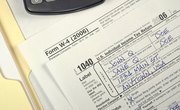Tax season is fast approaching and you might be wondering if you made enough money to file. You know you made less than $25,000, so does that mean you have to file a tax return on your income? According to the Internal Revenue Service, if you made less than the standard deduction, and you cannot be claimed as a dependent by someone else, you generally don't have to file because your tax burden would be zero.
However, even if you legally don't have to file, there are reasons you might want to file anyway. If your income is near the $25k tax bracket, you can use this information to determine your tax obligation at the end of the year.
Claiming Taxes From Your Paycheck
Even the smallest amount of income is taxable so even if you made less than $25,000, you most likely paid federal income tax. Check your pay stubs for federal deductions. These should say "FED TAX" or "Federal Tax." This total is the amount the federal government withheld from your paycheck for federal taxes.
If you received a W-2 from an employer, then you should file a tax return. If you received a paycheck from an employer, per the IRS the employer is required to report this payment to the government and send you a W2.
Not filing a return when you receive a W2 is ill-advised since the IRS will know the employer sent you one. This advice also applies if you worked as a contractor and a client sent you a 1099-NEC. If you earned $600 or more, your client is required to send you a 1099-NEC. It would be in your best interest to file taxes even if you only made $600.
Deducting Opportunities and Taxable Income
Making less than $25,000 in income does not mean you didn't have taxable income. If you had a job and collected a paycheck during the year, that money was most likely taxed. Even if only one dollar was taxable, you are required to file taxes on that dollar. The average tax return for single making $25,000 a year falls within the two lowest tax brackets, regardless of your filing status. These are the brackets for the 2021 tax year according to the IRS:
Single
- Taxable income = $0 - $9,950: 10 percent
- Taxable income = $9,951 - $40,525: 12 percent
Married Filing Jointly
- Taxable income = $0 - $19,990: 10 percent
- Taxable income = $19,991 - $81,050: 12 percent
Married Filing Separately
- Taxable income = $0 - $9,950: 10 percent
- Taxable income = $9,951 - $40,525: 12 percent
Head of Household
- Taxable income = $0 - $14,200: 10 percent
- Taxable income = $14,201 - $54,200: 12 percent
Filing Your Taxes
Even if you believe you aren't required to file a tax return, you could still be entitled to a refund. Completing your tax return using your preferred tax app is a good way to know if you need to file, and if not, if you're entitled to a refund.
Just because you made less than $25,000 doesn't mean you are exempt from filing taxes. Depending on your filing status, dependent status and other factors, filing a return with the IRS could be required. On the flip side (and a more positive note), you could also be eligible for a refund of any taxes you paid.
You can use IRS Form 1040 to file your income tax and claim any deductions that may be available to you. Hopefully, the information provided here will help you answer the question, "If I make $25,000 a year, how much tax will I pay?"
Read More: What Forms to Send with Form 1040
References
Resources
Writer Bio
K.A. Francis has been a freelance and small business owner for 20 years. She has been writing about personal finance and budgeting since 2008. She taught Accounting, Management, Marketing and Business Law at WV Business College and Belmont College and holds a BA and an MAED in Education and Training.
